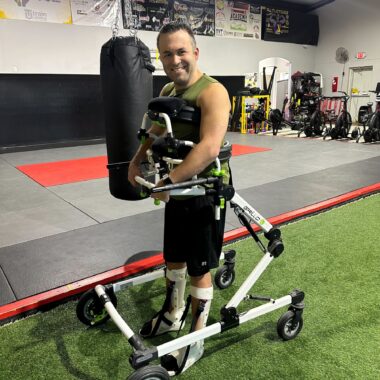Here we are, these dark horses, defying the odds
I thank those who helped me see beyond the hopelessness of FA
Written by |

“Friedreich’s ataxia.”
After long months of visiting different kinds of doctors all over my home state, those were the words the neurologist uttered.
My family and I had desperately sought a medical reason why I’d begun to doubt and question my functioning, even as my 9-year-old peers were getting more confident and suave in theirs.
Those words meant nothing to me at the time, which is the way many others with Friedreich’s ataxia (FA) react at the time of diagnosis. Though the ages we’re diagnosed and our symptoms may vary, FA often comes to us as an unfamiliar medical term with a strange German name. I might as well have been diagnosed with “Weinerschnitzel syndrome” or “Gesundheit gout.”
When we’re diagnosed, many of us don’t realize Friedriech’s ataxia is more than a temporary illness. At least, I didn’t. I had no idea what a constant FA would be and how it’d factor in almost every decision in my life.
We in the FA community are shackled to a monster that consumes a little more of us every day. Back then I felt we were nothing more than victims to be pitied. The odds of us being productive and happy seemed outrageously high. It seemed ridiculous to hope that we, like dark horses, could defy them.
The odds stacked against me
I kept losing physical function. A few years after my diagnosis, I couldn’t ignore that once foreign term — this “Friedreich’s ataxia” — any longer.
I began to research it. I learned that FA is a genetic, recessive disorder that limits patients’ production of frataxin, an essential chemical that facilitates cellular energy production. I read that my uncoordinated walking would develop into full-time wheelchair dependence and that my voice would eventually be slurred and difficult to understand.
Worst of all was the life expectancy of FA patients, which I’ve since learned is impossible to predict. Still, when I was around 12, I read that the average life expectancy of people with FA was 34.
That scared the hell out of me. Even though learning the science of FA was enlightening, discovering that my disorder was progressive, incurable, and often deadly was devastating. Any hope of getting better was replaced with a hope to hold on to my current function until a cure was discovered. Any dreams of having a family, being successful, and even mattering and being happy suddenly seemed out of reach.
For a long time, I couldn’t find any hope. I grieved the loss of the future I’d wanted for myself. Depression over life’s unfairness almost swallowed me. The odds seemed hopelessly stacked against me, against all of us in the FA community.
Defying the odds
Yet after years of feeling hopeless, and despite myself and my stubbornness, I came to a realization: I won’t act dead and defeated before I am. That’s my hope for everybody reading this.
I no longer feel that hopelessness, but I can’t forget that the fickle bastard of FA continues to take lives unexpectedly and far too soon. Some of my friends have died, and they were mostly younger and stronger than me. Death may come unexpectedly at any time for someone with FA.

Matt Lafleur stands in a gait trainer at Train Unique, a gym for special needs populations. (Courtesy of Matt Lafleur)
So I no longer wait passively for a cure to be found. I strive to be an active participant and use whatever platform I have to advocate on behalf of those with FA to help drive us closer to a cure.
I credit others in the FA community for getting me out of feeling hopeless. I know now what defying the odds looks like in the face of FA: It may look like riding a recumbent trike across America, starting a nonprofit that provides adventure to those with special needs, or being a bodybuilder, medical researcher, personal trainer, licensed social worker, lawyer, engineer, celebrity photographer, mother, or father.
Defying overwhelming odds isn’t an automatic byproduct of FA or any life challenge. We defy the odds when we see the devastation in front of us, and we don’t blink.
What’s one small way I’ve defied the odds? I expected to die at 34. This month, I turned 38. A little victory.
Here’s another way to defy the odds: No one’s ever seen anyone with FA transfer from full-time wheelchair use to a walker. I cannot use one independently yet, so it probably won’t be me, but before long, one of us will walk again.
In the immortal words of Robin Williams in “What Dreams May Come”: “Stick around, chief. You ain’t seen nothin’ yet.”
Note: Friedreich’s Ataxia News is strictly a news and information website about the disease. It does not provide medical advice, diagnosis, or treatment. This content is not intended to be a substitute for professional medical advice, diagnosis, or treatment. Always seek the advice of your physician or another qualified health provider with any questions you may have regarding a medical condition. Never disregard professional medical advice or delay in seeking it because of something you have read on this website. The opinions expressed in this column are not those of Friedreich’s Ataxia News or its parent company, Bionews, and are intended to spark discussion about issues pertaining to Friedreich’s ataxia.



Leave a comment
Fill in the required fields to post. Your email address will not be published.